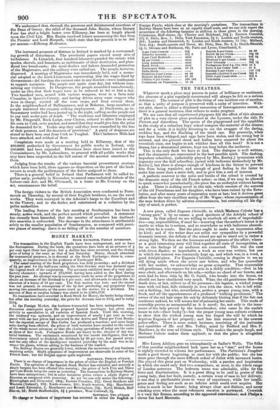A new piece, called Eugenia Claircille, in which Madame Celeste
has a "strong part," is by no means a good specimen of the Adelphi school of drama. In that school we are willing to overlook all sorts of improbablli- ties—nay, impossibilities, if need be—knowing that the author's intent is to startle us when he is serious, and to overwhelm us with ludicrous absurdi- ties when he is comic. But the piece ought to make an impression after its kind; and if the writer does not enlist our sympathies by a powerful dramatic interest, the defects of the school are apt to stand out in rather a strong light. We then see the looseness and abruptness of the affair; where- as a good interesting story will bind together all sorts of incongruities, as far as the feelings of an audience are concerned. This was the case with Green Bushes; as improbable a work as ever was written, but one in which the interest was constantly kept up, and which was, in a word, a good Adelphi piece. For Eugenia Claircille, coming in disguise to see an old dying uncle whom she never saw before, and who has quarrelled with her mother, we acknowledge no great sympathy. That respectable old gentleman, who reposes for two acts in a sickly condition,—first in his easy-chair, and afterwards on his sofa,—strikes no chord of our hearts; and even had he been slain by Mr. 0. Smith, who breaks into the house, we should not have shuddered very much. When the old gentleman dies—for death does, at last, relieve us of his presence—his legatee, a wicked young man with red hair, falls violently in love with the niece, who is left with- out a farthing, but who, nevertheless, prefers a proper young man, with a frock, and all the appurtenances of a professed "walking gentleman." The owner of the red hair urges his suit by delicately hinting that if the fair one continues unkind, he will accuse her of poisoning her uncle. This mode of courtship proves as unsuccessful as it is novel; for, not only is the inno- cence of the lady proved by the housebreaker, who came to the uncle's house to rob—(how lucky!)—but the proper young man collects evidence to show that the wicked young man has forged the will by which he deprives Eugenia of her property; and has him removed to the nearest police-office. There is some comic business, consisting of the jealousies and squabbles of Mr. and Mrs. Toffey, acted by Bedford and Mrs. F. Matthews, in the true ad libitum style. This makes the people laugh, and Madame Celeste makes them applaud; so that the piece is altogether successful.


























 Previous page
Previous page